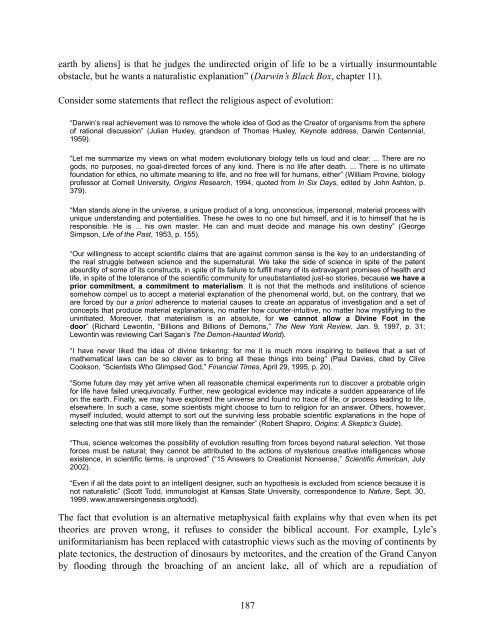an_unshakeable_faith.. - Holy Bible Institute
an_unshakeable_faith.. - Holy Bible Institute
an_unshakeable_faith.. - Holy Bible Institute
- No tags were found...
Create successful ePaper yourself
Turn your PDF publications into a flip-book with our unique Google optimized e-Paper software.
earth by aliens] is that he judges the undirected origin of life to be a virtually insurmountableobstacle, but he w<strong>an</strong>ts a naturalistic expl<strong>an</strong>ation” (Darwin’s Black Box, chapter 11).Consider some statements that reflect the religious aspect of evolution:“Darwin’s real achievement was to remove the whole idea of God as the Creator of org<strong>an</strong>isms from the sphereof rational discussion” (Juli<strong>an</strong> Huxley, gr<strong>an</strong>dson of Thomas Huxley, Keynote address, Darwin Centennial,1959).“Let me summarize my views on what modern evolutionary biology tells us loud <strong>an</strong>d clear. ... There are nogods, no purposes, no goal-directed forces of <strong>an</strong>y kind. There is no life after death. ... There is no ultimatefoundation for ethics, no ultimate me<strong>an</strong>ing to life, <strong>an</strong>d no free will for hum<strong>an</strong>s, either” (William Provine, biologyprofessor at Cornell University, Origins Research, 1994, quoted from In Six Days, edited by John Ashton, p.379).“M<strong>an</strong> st<strong>an</strong>ds alone in the universe, a unique product of a long, unconscious, impersonal, material process withunique underst<strong>an</strong>ding <strong>an</strong>d potentialities. These he owes to no one but himself, <strong>an</strong>d it is to himself that he isresponsible. He is ... his own master. He c<strong>an</strong> <strong>an</strong>d must decide <strong>an</strong>d m<strong>an</strong>age his own destiny” (GeorgeSimpson, Life of the Past, 1953, p. 155).“Our willingness to accept scientific claims that are against common sense is the key to <strong>an</strong> underst<strong>an</strong>ding ofthe real struggle between science <strong>an</strong>d the supernatural. We take the side of science in spite of the patentabsurdity of some of its constructs, in spite of its failure to fulfill m<strong>an</strong>y of its extravag<strong>an</strong>t promises of health <strong>an</strong>dlife, in spite of the toler<strong>an</strong>ce of the scientific community for unsubst<strong>an</strong>tiated just-so stories, because we have aprior commitment, a commitment to materialism. It is not that the methods <strong>an</strong>d institutions of sciencesomehow compel us to accept a material expl<strong>an</strong>ation of the phenomenal world, but, on the contrary, that weare forced by our a priori adherence to material causes to create <strong>an</strong> apparatus of investigation <strong>an</strong>d a set ofconcepts that produce material expl<strong>an</strong>ations, no matter how counter-intuitive, no matter how mystifying to theuninitiated. Moreover, that materialism is <strong>an</strong> absolute, for we c<strong>an</strong>not allow a Divine Foot in thedoor” (Richard Lewontin, “Billions <strong>an</strong>d Billions of Demons,” The New York Review, J<strong>an</strong>. 9, 1997, p. 31;Lewontin was reviewing Carl Sag<strong>an</strong>’s The Demon-Haunted World).“I have never liked the idea of divine tinkering: for me it is much more inspiring to believe that a set ofmathematical laws c<strong>an</strong> be so clever as to bring all these things into being” (Paul Davies, cited by CliveCookson, “Scientists Who Glimpsed God,” Fin<strong>an</strong>cial Times, April 29, 1995, p. 20).“Some future day may yet arrive when all reasonable chemical experiments run to discover a probable originfor life have failed unequivocally. Further, new geological evidence may indicate a sudden appear<strong>an</strong>ce of lifeon the earth. Finally, we may have explored the universe <strong>an</strong>d found no trace of life, or process leading to life,elsewhere. In such a case, some scientists might choose to turn to religion for <strong>an</strong> <strong>an</strong>swer. Others, however,myself included, would attempt to sort out the surviving less probable scientific expl<strong>an</strong>ations in the hope ofselecting one that was still more likely th<strong>an</strong> the remainder” (Robert Shapiro, Origins: A Skeptic’s Guide).“Thus, science welcomes the possibility of evolution resulting from forces beyond natural selection. Yet thoseforces must be natural; they c<strong>an</strong>not be attributed to the actions of mysterious creative intelligences whoseexistence, in scientific terms, is unproved” (“15 Answers to Creationist Nonsense,” Scientific Americ<strong>an</strong>, July2002).“Even if all the data point to <strong>an</strong> intelligent designer, such <strong>an</strong> hypothesis is excluded from science because it isnot naturalistic” (Scott Todd, immunologist at K<strong>an</strong>sas State University, correspondence to Nature, Sept. 30,1999, www.<strong>an</strong>swersingenesis.org/todd).The fact that evolution is <strong>an</strong> alternative metaphysical <strong>faith</strong> explains why that even when its pettheories are proven wrong, it refuses to consider the biblical account. For example, Lyle’suniformitari<strong>an</strong>ism has been replaced with catastrophic views such as the moving of continents byplate tectonics, the destruction of dinosaurs by meteorites, <strong>an</strong>d the creation of the Gr<strong>an</strong>d C<strong>an</strong>yonby flooding through the broaching of <strong>an</strong> <strong>an</strong>cient lake, all of which are a repudiation of187
















